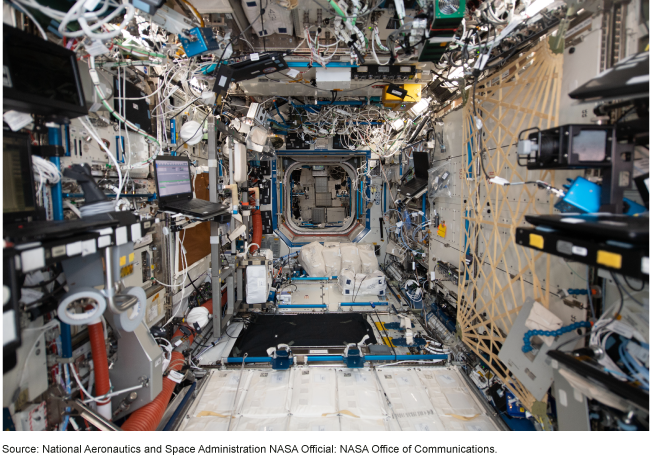International Space Station: Opportunities Exist to Improve Communication with National Laboratory Users
Fast Facts
The Center for the Advancement of Science in Space manages the International Space Station National Laboratory for NASA.
Some companies and universities not affiliated with NASA may want access to the lab for research that can't be done on Earth. The Center allocates resources, such as time astronauts may spend on these research projects. Recently, the Center formed an advisory committee of these users to improve communication about resource allocation. But the Center hasn't asked for key input, and some committee members said that more transparency could benefit the user community.
Our recommendations address these issues and more.
The International Space Station National Laboratory

Highlights
What GAO Found
The Center for the Advancement of Science in Space (CASIS) manages the International Space Station National Laboratory through a cooperative agreement with the National Aeronautics and Space Administration (NASA). NASA is responsible for providing performance feedback to CASIS.
In November 2020, CASIS formed and staffed an advisory committee of laboratory users, such as academic researchers, with prior experience working with the space station to inform planning for and use of laboratory resources (see figure).
Types of International Space Station National Laboratory (ISSNL) Resources

CASIS officials have not obtained input from the advisory committee on how to allocate laboratory resources, even though the committee is chartered to advise CASIS on resource utilization. CASIS officials stated they have not obtained this input for several reasons, including that the committee is unlikely to provide a consensus perspective. However, a lack of consensus does not preclude communication. Diverse input could enhance CASIS's understanding of risks and opportunities across the laboratory portfolio.
Additionally, CASIS has not routinely provided the advisory committee information about past and planned resource allocations, including visibility into the flight queue for projects waiting to travel to the International Space Station. The chairs of the advisory committee and its five subcommittees told GAO they could more effectively advise CASIS if they had more information about past resource allocations. These members also stated that greater transparency into planned allocations would be valuable for users conducting time-sensitive research—such as biological science research involving cell and tissue samples. CASIS officials said they have not routinely provided the committee this information because the resource allocation process is complex and fluid. However, NASA and CASIS officials acknowledged laboratory users would benefit from improved visibility into the resource allocation process.
Why GAO Did This Study
Statute generally requires that a portion of the U.S. allocated research capacity be guaranteed to experiments on the national laboratory for non-NASA users like commercial entities. CASIS is responsible for selecting which non-NASA users can use the laboratory. In 2019, NASA commissioned an independent review that identified various challenges at CASIS, including poor communication with the user community.
GAO was asked to review CASIS and NASA activities related to the laboratory. Among other objectives, this report assesses the extent to which CASIS obtains input from and provides information to laboratory users.
GAO reviewed documents such as the cooperative agreement between NASA and CASIS and their operating principles. GAO also interviewed the chairs of CASIS's user advisory committee and its five subcommittees, and officials from NASA and CASIS.
Recommendations
GAO is making four recommendations to NASA, including that it ensures CASIS (1) obtains input from its user advisory committee about resource allocation decisions, (2) takes steps to agree upon needed information about past allocations, and (3) provides the committee more information about planned resource allocations. NASA agreed with the first two recommendations, and partially agreed with the third, noting challenges with providing the flight queue. GAO continues to believe NASA has opportunities to provide additional information, as discussed in the report.
Recommendations for Executive Action
| Agency Affected | Recommendation | Status |
|---|---|---|
| National Aeronautics and Space Administration | The NASA Administrator should ensure the CEO of CASIS obtains input from the UAC regarding ISSNL resource allocation decisions. (Recommendation 1) |
NASA concurred with this recommendation and took actions with CASIS to implement it. Throughout 2022, CASIS established monthly meetings to receive input from UAC members, and established a web-based interface to gather input that was shared with users in July 2022.
|
| National Aeronautics and Space Administration | The NASA Administrator should ensure the CEO of CASIS works with the UAC to agree upon the types of data and information on past resource allocations that the UAC needs to support CASIS. (Recommendation 2) |
NASA concurred with this recommendation and took actions with CASIS to implement it. CASIS established monthly meetings to determine what information on past resource allocations should be briefed, and provided that information to the UAC in June 2022.
|
| National Aeronautics and Space Administration | The NASA Administrator should ensure the CEO of CASIS provides ISSNL users visibility into the entirety of CASIS's planned resource allocations, including the flight queue. (Recommendation 3) |
NASA partially concurred with the recommendation and took actions with CASIS to implement it. In June 2022, CASIS briefed the UAC on its process for planning resource allocations. NASA and CASIS also provided the UAC with a tentative flight queue organized by 6-month increment beginning in March 2023.
|
| National Aeronautics and Space Administration | The NASA Administrator should ensure the CEO of CASIS establishes a timeframe for finalizing a succession plan for the UAC that allows current and new members' terms to overlap. (Recommendation 4) |
NASA concurred with the recommendation and took action with CASIS to implement it. In June 2022, CASIS created a revised UAC charter that contained a succession plan with overlapping terms. CASIS and NASA officials finalized the charter in January 2023.
|
